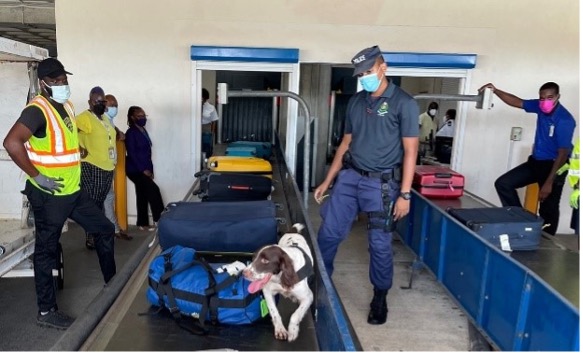
UNODC Global Firearms Programme Training on detection of firearms trafficking and related offences in Barbados
On 9-12 October 2021, as part of the project “Supporting the implementation of the crime prevention and criminal justice component of the Caribbean Firearms Roadmap”, the UNODC Global Firearms Programme (GFP), in cooperation with AIRCOP, delivered a training on detection of firearms trafficking and related offences via air, maritime borders and using postal and fast parcels in Barbados. The four-day training included lectures, practical exercises and sessions of questions and answers. The practical exercises focused on searching for concealed firearms and parts and components in vehicles, identifying risk indicators, or visiting Customs at Bridgetown’s international airport and harbour. Lecturers included, in addition to GFP staff, experts from EUROPOL, INTERPOL, FRONTEX, the US Bureau of Alcohol, Tobacco, Firearms and Explosives, and Small Arms Survey, inter alia. As a result of this activity, 16 national experts developed their capacities on detection of firearms trafficking in line with established procedures and operational tactics, and to increase inter agency cooperation at the borders.
The activity was part of the project “Supporting the implementation of the crime prevention and criminal justice component of the Caribbean Firearms Roadmap”, aimed to prevent and counter illicit manufacturing of and trafficking in firearms and their links to transnational organised crime and other serious crimes, and ultimately to address the scourges of armed violence in the region by:
- Enhanced capacity of criminal justice system to counter illicit proliferation and misuse of firearms in the context of the Caribbean Roadmap and reinforce legislative and regulatory frameworks to comply with international and regional instruments
- Enhanced capacity of criminal justice institutions and border management services to detect, investigate, prosecute, and adjudicate illicit firearms trafficking cases and related offences, and to engage in effective law enforcement and judicial cooperation for that purpose.
- Promote effective international cooperation and sharing of information and good practices among firearms and organised crime practitioners on the prevention and combat of firearms trafficking and related crimes, through regular contacts and use of specialised cooperation networks and platforms.
- Monitoring illicit trafficking flows through enhanced periodic data collection and analysis on firearms and related matters.











